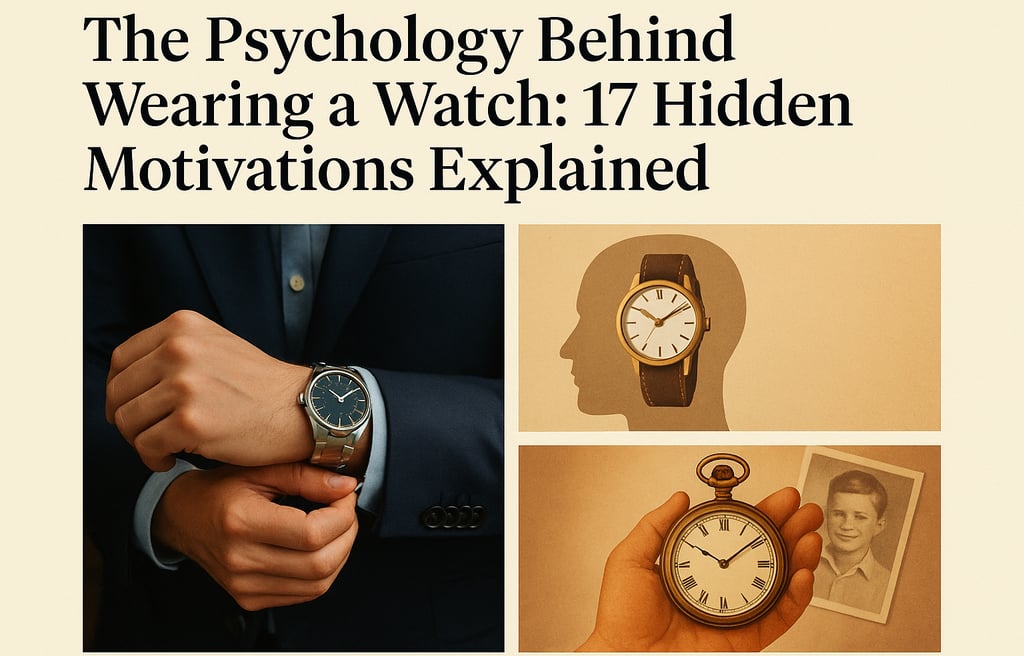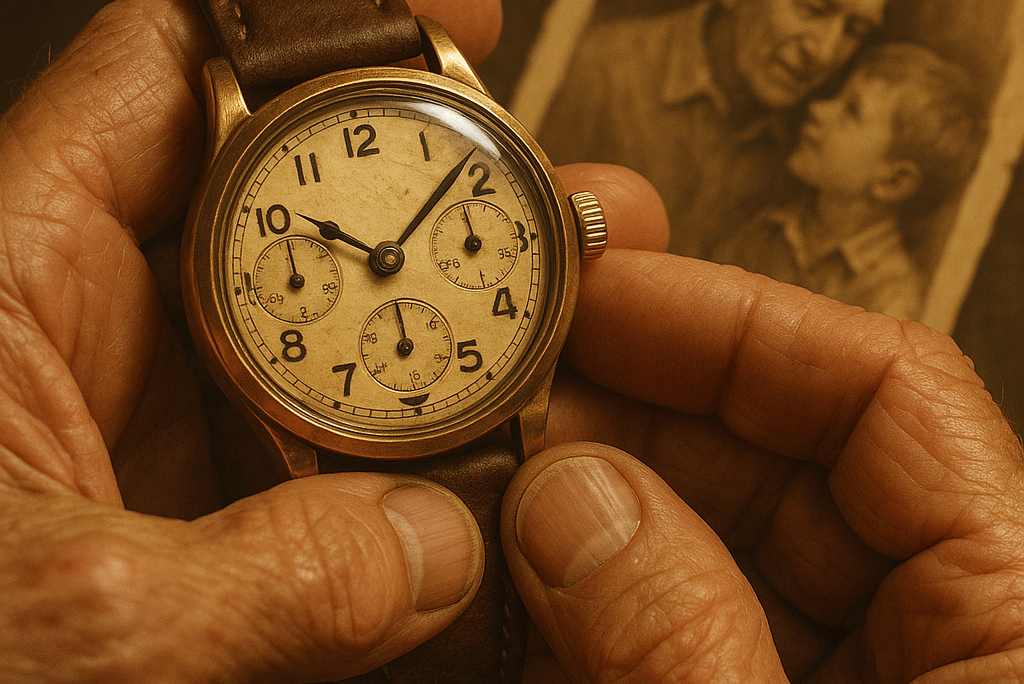The Psychology Behind Wearing a Watch: 17 Hidden Motivations Explained
The Psychology Behind Wearing a Watch uncovers 17 fascinating psychological reasons why people wear timepieces—from identity and routine to status and memory.
7/11/2025


The Psychology Behind Wearing a Watch: 17 Hidden Motivations Explained
Why Watches Are More Than Just Timekeepers
Wearing a watch isn’t just about telling time. In a world filled with smartphones and smart devices, people still choose to wear watches—for reasons far beyond function. The act of strapping a watch to your wrist reveals something deeper: a powerful connection to identity, values, habits, and even emotional well-being.
This article explores the psychology behind wearing a watch—17 powerful insights that explain why this timeless accessory remains meaningful in the digital age.
A Brief History of Wristwatches and Their Cultural Significance
Evolution from Pocket Watches to Wristwatches
Watches began as pocket-sized tools for the elite in the 16th century, evolving into wristwatches in the early 20th century. Their shift was accelerated by military needs, where quick access to time was crucial. Over time, they became popular fashion statements and tools of organization.
Watches as Status Symbols Over Time
In the 1950s and 60s, watches like Rolex and Omega were luxury statements. They weren’t just tools—they represented success, reliability, and a life of order. This cultural programming persists today.
The Subconscious Signals of Wearing a Watch
Perceived Punctuality and Reliability
Psychologically, someone wearing a watch is often perceived as more punctual and dependable. This perception stems from a subconscious belief that such individuals value time and responsibility.
Watches and First Impressions
First impressions are often formed in seconds. A watch can subtly enhance your image by adding polish, purpose, and a hint of discipline—key traits that affect trust and rapport.
Watches and Self-Identity: What Your Watch Says About You
Style Preferences and Personality Types
Watch styles reflect personality. A minimalist watch suggests order and clarity. A bold chronograph hints at adventure. The choice reveals your taste, confidence, and even your worldview.
Digital vs. Analog: A Psychological Divide
Analog watch wearers tend to appreciate tradition and structure. Digital watch users may prefer innovation and efficiency. Your choice subtly signals your psychological orientation.
The Role of Habit and Routine in Wearing Watches
Ritual and Control Over Time
Wearing a watch every morning becomes part of a daily ritual—a symbolic act that grants a sense of control and order, grounding your day in rhythm and structure.
Watches and Cognitive Anchoring
Psychologists use the term “anchoring” to describe how certain items become tied to mental stability. A watch becomes an anchor—reminding you of who you are, what you value, and how you engage with the world.
Time Perception: How Wearing a Watch Affects Your Mindset
Enhanced Time Awareness
People who wear watches tend to be more time-aware. Studies show they are better at estimating elapsed time, potentially improving productivity and reducing tardiness.
Time Anxiety and Watch-Wearing Behavior
However, this awareness can also lead to “time anxiety.” Constant checking may heighten stress or create pressure to perform, especially in high-stakes professions.
Gender Psychology and Watch Wearing
Masculinity, Femininity, and Timepieces
Watches are often gender-coded. Large, mechanical designs are marketed toward masculinity—projecting power and dominance. Slim, ornamental watches appeal to femininity and grace.
Gendered Marketing and Psychological Influence
These marketing patterns influence buyers subconsciously. They tap into social constructs and self-image, shaping how individuals see themselves—and want to be seen.
Social Proof and Conformity in Watch Wearing
Influencer Culture and Peer Influence
Seeing your favorite celebrity or influencer wear a specific watch can shape your buying decisions. This is known as social proof, a psychological phenomenon where people mirror behaviors seen as socially accepted.
Brand Recognition and Psychological Pull
Wearing a well-known brand like Rolex or TAG Heuer taps into status psychology. It’s not just a purchase; it’s a signal to others about where you belong in the social hierarchy.
The Emotional Attachment to Watches
Sentimental Value and Memory Association
Watches often become deeply personal. A gifted watch or one worn during major life events becomes a keepsake, tied to memories, relationships, and milestones.
Inherited Timepieces and Legacy Psychology
Passing down a watch across generations turns it into a legacy item. The emotional weight of this tradition creates a psychological bridge between past, present, and future.
Luxury Watches and Psychological Gratification
Status, Power, and Reward Psychology
Owning a luxury watch taps into reward psychology. It serves as a tangible representation of hard work, success, and social achievement.
The Dopamine of Ownership and Display
Buying and wearing a luxury timepiece activates dopamine release—the brain’s pleasure chemical—boosting mood, self-esteem, and confidence in social situations.
The Psychology of Not Wearing a Watch
Freedom from Time Constraints
Some consciously choose not to wear a watch to avoid feeling “tied” to time. This detachment offers a sense of freedom and spontaneity.
Digital Alternatives and Shifting Habits
Smartphones and smartwatches have reshaped how we perceive time. The shift reflects broader psychological changes—toward flexibility, multi-functionality, and digital dependence.
Watches in Professional and Social Settings
Business Etiquette and Time Management
Wearing a watch in business settings is seen as a sign of professionalism. It communicates that you value punctuality, control, and efficiency—key attributes in corporate psychology.
Social Clout and Accessorizing for Impact
Beyond function, a well-chosen watch elevates your appearance. It adds social clout, enhancing your presence in meetings, dates, or formal events.
Watches vs. Smartphones: A Psychological Showdown
Cognitive Overload and Minimalism
Smartphones bombard us with notifications. Watches offer a minimalist alternative—letting you check time without distraction, helping reduce cognitive overload.
Conscious vs. Passive Time Checking
Checking a watch is an intentional act. It strengthens time-awareness and minimizes distraction. Smartphones, on the other hand, often pull attention into unrelated tasks.
Symbolism and Watch Gifting Psychology
Meaning Behind Giving and Receiving Watches
Giving a watch symbolizes timeless love, lasting commitment, and trust. It’s a gift loaded with emotional weight, often chosen for birthdays, anniversaries, or graduations.
Emotional Bonding Through Gifts
Psychologically, gift-giving enhances bonds. A watch becomes a shared symbol between giver and receiver—deepening connection and mutual appreciation.
Case Study: Celebrity Watch Choices and Their Psychological Message
Analysis of Iconic Figures and Their Watch Brands
Celebrities like David Beckham (Tudor), Barack Obama (Jorg Gray), and Ellen DeGeneres (Rolex) wear timepieces that mirror their personal image—projecting reliability, sophistication, or charisma.
Psychological Branding in Watch Endorsements
Brands align with celebrities who reflect their ideal customer identity. The psychology behind this is aspirational—buyers want to emulate success, elegance, or boldness.
FAQs About The Psychology Behind Wearing a Watch
Q1. Why do people still wear watches in the smartphone era?
Watches offer style, emotional value, and quick access to time without the distraction of a phone.
Q2. Does wearing a watch make you more punctual?
Yes, research suggests watch wearers are more aware of time and tend to manage it more effectively.
Q3. What does my watch choice say about me?
Your watch reflects your personality, values, and lifestyle preferences—from minimalist to extravagant.
Q4. Are luxury watches worth the investment psychologically?
They can boost self-esteem and symbolize success, offering both emotional satisfaction and social recognition.
Q5. Why do some people feel “naked” without a watch?
This stems from psychological anchoring and habit. A watch becomes part of one’s identity and routine.
Q6. Is gifting a watch a good idea?
Absolutely. Watches make meaningful, sentimental gifts that symbolize lasting commitment and thoughtfulness.
Conclusion: Why a Watch Is a Window Into the Wearer's Mind
At first glance, a watch is just a timepiece. But peel back the layers, and you'll discover that it's so much more—a mirror of personality, a symbol of success, and a memory holder. Whether you're drawn to its aesthetic, its legacy, or its psychological comfort, wearing a watch is a deeply personal act.
From status and routine to memory and identity, the psychology behind wearing a watch tells a compelling story—one that ticks just beneath the surface.



